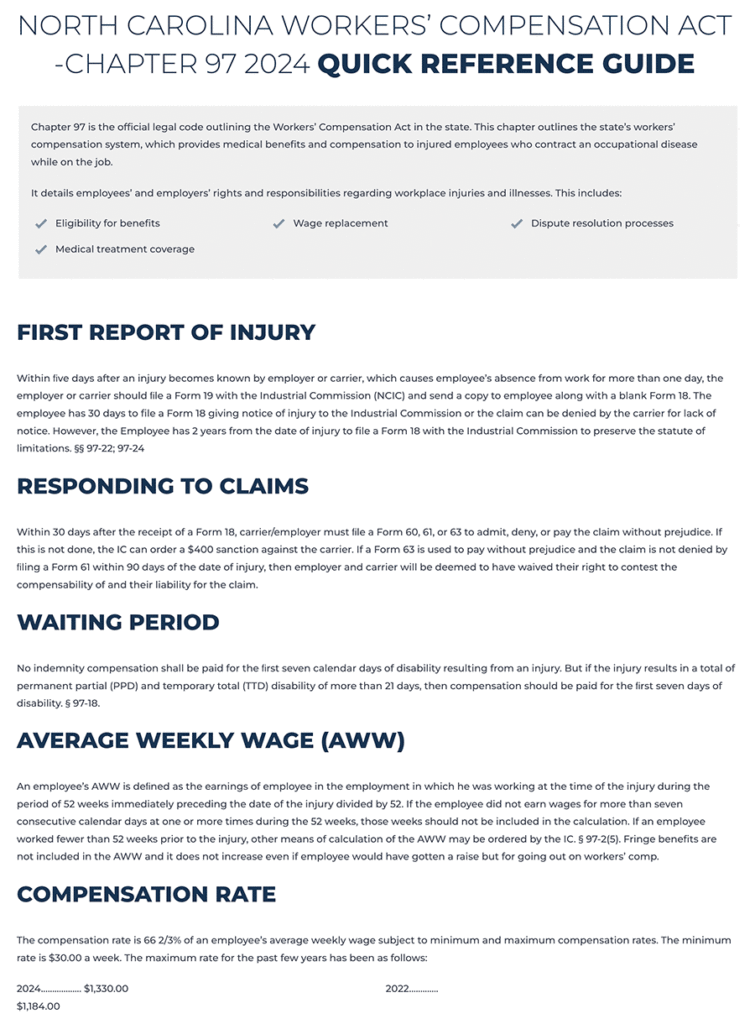How long do you have to file a claim after a workplace injury or occupational disease?
If you or a loved one were injured in a job-related accident or recently diagnosed with a serious occupational illness, it’s easy to be overwhelmed and forget about your responsibilities and obligations under North Carolina’s workers’ compensation law. However, from the moment of your accident or diagnosis, a clock starts ticking that will ultimately determine whether or not you’re able to get the benefits provided to most injured workers in the state.
This clock is known in the legal world as the “statute of limitations,” and it can have a huge impact on your ability to obtain workers’ compensation benefits.
Each state has a different statute of limitations for workers’ compensation cases, and there are even individual deadlines when it comes to important milestones in your claim such as:
- Reporting your injury to your employer
- Filing a workers’ compensation claim
- Appealing a claim denial
Missing any one of these deadlines could completely derail your workers’ compensation case, which is why it’s important to understand these limitations and work with an experienced attorney at the Wilder Law Group who can keep your claim on track.
In the meantime, get informed by reviewing the most important deadlines when filing a workers’ compensation claim in North Carolina.
|
North Carolina workers’ compensation statute of limitations and deadlines
|
||||
|---|---|---|---|---|
| You must… | Within… | |||
| Notify your employer | 30 days of the accident or diagnosis | |||
| File a claim (Form 18 or 18B) with the Industrial Commission | 2 years of the accident or diagnosis | |||

Chapter 97 is the official legal code outlining the Workers’ Compensation Act in the state. It details employees’ and employers’ rights and responsibilities regarding workplace injuries and illnesses. This includes:
- Eligibility for benefits
- Medical treatment coverage
- Wage replacement
- Dispute resolution processes
How long do I have to report an accident or injury to my employer?
In N.C.G.S. § 97-22, North Carolina’s Workers’ Compensation Act clearly states that injured workers are to notify their employer of an injury or illness immediately; however, 30 days is the maximum time allowed:
Every injured employee or his representative shall immediately on the occurrence of a written notice of the accident, … unless it can be shown that the employer, his agent or representative, had knowledge of the accident, …; but no compensation shall be payable unless such written notice is given within 30 days after the occurrence of the accident or death, unless reasonable excuse is made to the satisfaction of the Industrial Commission for not giving such notice and the Commission is satisfied that the employer has not been prejudiced thereby.
Does notice of a work injury have to be written?
Not necessarily, though this is generally recommended.
In one relevant case (Richardson v. Maxim Healthcare), the plaintiff was injured in an auto accident but did not give written notice of the accident to her employer until she filed Form 18 over a year later. However, the Industrial Commission noted that the plaintiff did notify her employer by telephone within 30 minutes after the collision, providing the employer actual “knowledge of the accident.” The employer was also aware of the plaintiff’s injuries and medical treatments based on her regular communications between May 2001 and May 2002.
In turn, these findings support the Commission’s conclusion that in light of the employer’s immediate actual knowledge of the plaintiff’s injury by accident, “defendants were not prejudiced by her failure to immediately file a written notice.” Thus, the Commission concluded that the injured worker complied with the requirements of Section 97-22 in providing immediate actual notice to her employer, which was a reasonable excuse for not giving timely written notice, and by satisfying the Commission “that the employer has not been prejudiced thereby.”
The plain language of Section 97-22 requires an injured employee to give written notice of an accident “unless it can be shown that the employer, his agent or representative, had knowledge of the accident.”
When an employer has actual notice of the accident, the employee doesn’t need to give written notice, and therefore, the Commission need not make any findings about prejudice.
The second clause of N.C.G.S. § 97-22 applies to those cases in which written notice is required because the employer has no actual notice of the accident. It explains that an employee may be excused from even that requirement by providing a reasonable excuse for failing to give notice and by showing that the employer has not been prejudiced.
How long do I have to file a workers’ compensation claim after an injury or accident?
The time limit for filing a claim for an injury by accident is clearly set out in N.C.G.S. § 97-24, which says in part:
(a) The right to compensation under this Article shall be forever barred unless (i) a claim or memorandum of agreement as provided in G.S. 97-82 is filed with the Commission or the employee is paid compensation as provided under this Article within two years after the accident or (ii) a claim or memorandum of agreement as provided in G.S. 97-82 is filed with the Commission within two years after the last payment of medical compensation when no other compensation has been paid and when the employer’s liability has not otherwise been established under this Article.
In other words, you generally have 2 years from the date of the accident, injury or diagnosis (in the case of occupational disease) in which to file a claim.
There are few exceptions; however, the North Carolina Supreme Court has previously held that the employer’s conduct can waive the time requirement set forth in N.C.G.S. § 97-24 in the case Biddix v. Rex Mills, Inc. (1953).
The 2-year deadline has repeatedly been held to be a condition precedent to the right to compensation and not a “statute of limitations.” A condition precedent, unlike subject matter jurisdiction, may be waived by the beneficiary party by virtue of its conduct.
It’s worth noting that this deadline is shorter than North Carolina personal injury claims, such as auto accidents and slip and falls not related to work, which have a 3-year statute of limitations. This distinction is confusing for many injured workers, and yet another reason why it’s important to consult with an experienced attorney as soon as possible following your work injury.
How long do I have to file a claim for an occupational disease?
North Carolina’s laws regarding occupational diseases and the time limit for filing claims can be found in § 97-58. Under this law, occupational disease claims must be filed within 2 years after the affected worker’s death, disability or disablement.
More specifically, this statute says:
… (b) The report and notice to the employer as required by G.S. 97-22 shall apply in all cases of occupational disease except in case of asbestosis, silicosis, or lead poisoning. The time of notice of an occupational disease shall run from the date that the employee has been advised by competent medical authority that he has same.
(c) The right to compensation for occupational disease shall be barred unless a claim be filed with the Industrial Commission within two years after death, disability, or disablement as the case may be. Provided, however, that the right to compensation for radiation injury, disability or death shall be barred unless a claim is filed within two years after the date upon which the employee first suffered incapacity from the exposure to radiation and either knew or in the exercise of reasonable diligence should have known that the occupational disease was caused by his present or prior employment.
Payment with denial constitute claim acceptance
While not a deadline per se, it’s worth noting that if an employer/insurance carrier makes a payment of medical and temporary total disability benefits without contesting liability within 90 days, then under G.S. 97-18.1 this constitutes acceptance of the claim and amounts to an award of the Commission.
How long do I have to appeal a workers’ comp claim denial?
If you are unhappy with the ruling from the North Carolina Industrial Commission hearing, you can choose to appeal your case to the Full Commission, Court of Appeals and finally the state Supreme Court. For each of these appeals, there are different deadlines you must meet.
To appeal to the Full Commission, you must submit a File Notice of Appeal to the Full Commission form within 15 days from receipt of the Deputy Commissioner’s ruling. Alternatively, you can file a Motion to Reconsider with the Deputy Commissioner who issued the ruling, but you must also do so within 15 days from the initial decision.
To appeal the Full Commission ruling, you have 30 days from the date of receipt to file a Notice of Appeal to the Court of Appeals.
How long do I have to file a retaliation claim?
Employment law in North Carolina clearly states that employers and companies may not retaliate against an employee for filing a workers’ compensation claim. This includes getting a demotion, pay cut or even being fired. However, sadly this law doesn’t stop many employers from retaliating anyway.
If your employer retaliated against you for filing a workers’ compensation claim, then you have 3 years to file a retaliation claim. That said, you only have 180 days to file a complaint with the North Carolina Employee Discrimination Bureau if you want help from this state agency.
Don’t delay in contacting our experienced North Carolina attorneys
Presenting a compelling claim backed by strong evidence takes time and a lot of hard work—and unfortunately, time is not on your side when seeking workers’ compensation benefits. Make no mistake that your employer or their insurance company will do everything they can to delay and derail your case by throwing up obstacles and waiting to the last minute to respond. This is often done intentionally to make claimants miss important deadlines and lose their right to file a claim.
With so many strict deadlines, it’s vitally important that you consult with an attorney near you who is deeply knowledgeable of North Carolina law and the statute of limitations.
At Wilder Law Group, our work injury attorneys are nationally recognized North Carolina State Bar Board Certified Workers’ Compensation Specialists. We’ve received numerous honors and awards, and we are regularly invited to speak as authorities in North Carolina law. We are ready to use this knowledge and experience to help you recover the financial help you so desperately need during this difficult time.


